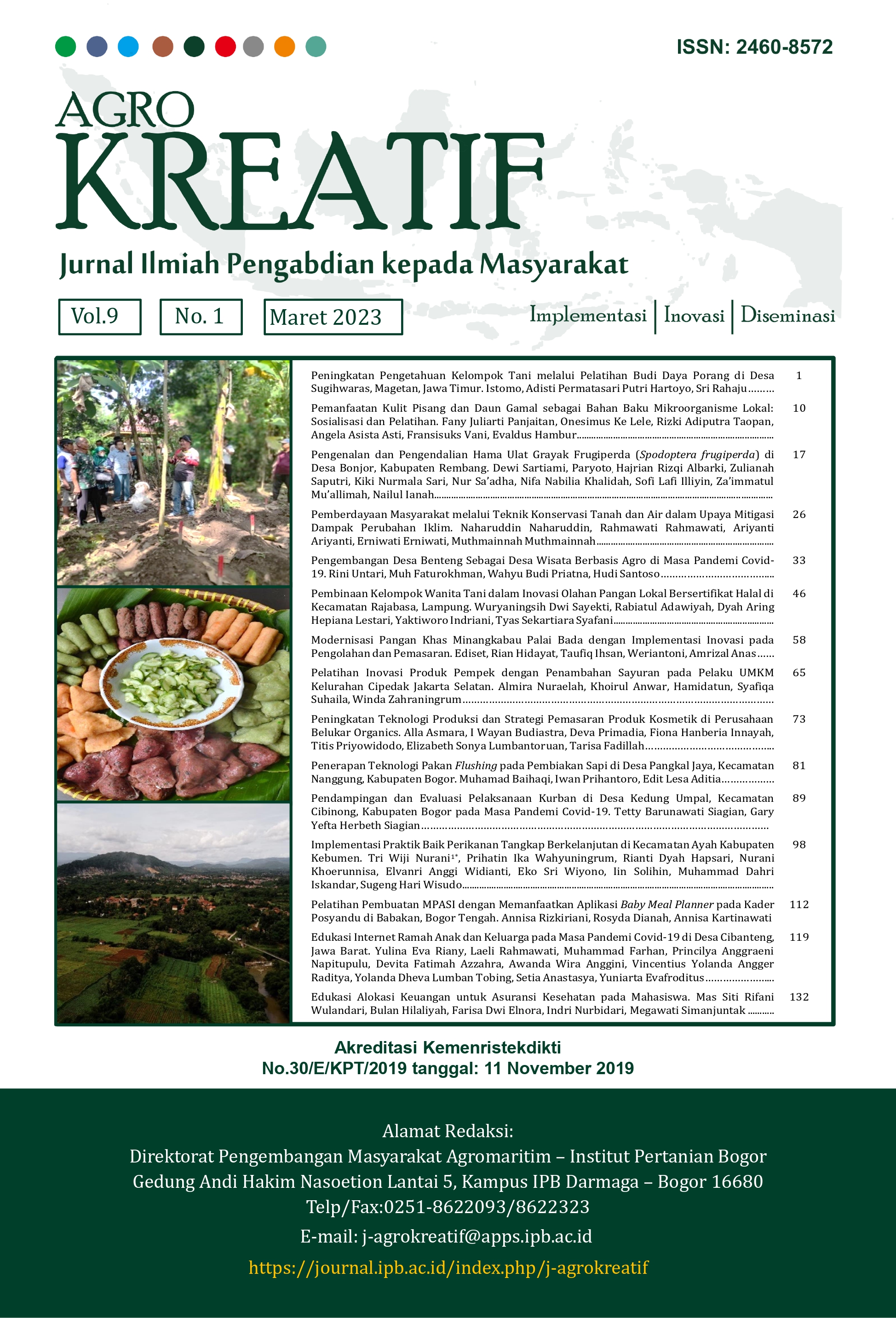Edukasi Alokasi Keuangan untuk Asuransi Kesehatan pada Mahasiswa
Abstract
The Covid-19 pandemic has made people aware of the importance of staying healthy and protecting themselves before the disease strikes. The Health Insurance Funding Educational Campaign is a program designed to increase the knowledge of college students so they can properly allocate their finances. Educational delivery was conducted online via Zoom Meeting with 36 participants. Due to the PSBB (Large-Scale Social Restrictions) program to prevent the spread of Covid-19, the education was conducted in Zoom meetings. The method includes lecture, discussion and assessment by completing pre- and post-tests. This material explains the urgency of insurance during this time. The educational activities resulted in participants' increased knowledge of health insurance and proper financial attribution, as reported by completing pre-and post-tests. The implementation of these educational activities has encountered some obstacles, such as the inability of the event organizers to directly monitor each participant so that they can keep an eye on the process of the event.
Downloads
References
Becker J, Kovach AC, Gronseth DL. 2004. Individual empowerment: How community health workers operationalize self-determination, self-sufficiency, and decision-making abilities of low-income mothers. Journal of Community Psychology. 32 (3): 327–342. https://doi.org/10.1002/jcop.20000
Hunter GL, Garnefeld I. 2008. When does consumer empowerment lead to satisfied customers? Some mediating and moderating effects of theempowerment-satisfaction link. Journal of Research for Consumers. 15: 1‒4.
Jarva V. 2011. Consumer education and everyday futures work. Futures. 43(1): 99‒111. https://doi.org/10.1016/j.futures.2010.10.016
Kefela GT. 2010. Promoting access to finance by empowering consumers. Educational Research and Reviews. 5(5): 205‒212.
Knights C. 2000. Educating tomorrow’s consumers today: an introduction to consumer education. Consumer international: Office for Developed and Transition Economies. [internet]. [diunduh 20 November 2013]. Tersedia pada:http://www.consumerinternational.org/media/301214/educating%20tomorrow%...consumer%20today.pdf.
Munadi S. 2009. Asuransi kesehatan kumpulan untuk perawatan rumah sakit. Jurnal Matematika. 12(2): 61‒69.
[OJK] Otoritas Jasa Keuangan. 2013. Literasi Keuangan. Literasi Keuangan [internet]. [diunduh 24 November 2016]. Tersedia pada: http://www.ojk.go.id/id/kanal/edukasi-dan-perlindungan-konsumen/Pages/Literasi-Keuangan.aspx
Puspharini LA, Hidayati C. 2016. Perencanaan keuangan keluarga melalui optimalisasi investasi pada tabungan, asuransi, dan reksadana berdasar prioritas tujuan. Jurnal Ekonomi Akuntansi. 1(1): 51‒66. https://doi.org/10.30996/jea17.v1i01.649
Sarwo YB. 2012. Asuransi kesehatan sosial sebagai model pembiayaan kesehatan menuju jaminan semesta (universal coverage). Masalah-Masalah Hukum. 41(3): 443–450.
Simanjuntak M, Yuliati L. 2016. Mapping of Indonesia Consumer Empowerment Index 2016. (Research Report). Bogor (ID): Bogor Agricultural University.
Simanjuntak M. 2014. Tingkat keberdayaan dan strategi pemberdayaan konsumen [disertasi]. Bogor (ID): Institut Pertanian Bogor.
Stroe MA. 2014. Insurance and consumer perception in Romanian insurance market. Procedia Economics and Finance. 15: 1717–1723. https://doi.org/10.1016/S2212-5671(14)00646-7
Widjajanti K. 2011. Model pemberdayaan masyarakat. Jurnal Ekonomi Pembangunan. 12(1): 15‒27. https://doi.org/10.23917/jep.v12i1.202
Wilper AP, Woolhandler S, Lasser KE, McCormick D, Bor DH, Himmelstein DU. 2009. Health Insurance and Mortality in US Adults. American Journal of Public Health. 99(12): 2289‒2295. https://doi.org/10.2105/AJPH.2008.157685
This work is licensed under a Creative Commons Attribution-NonCommercial 4.0 International License.



















